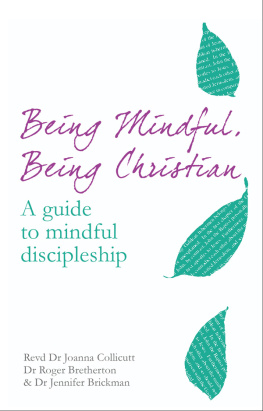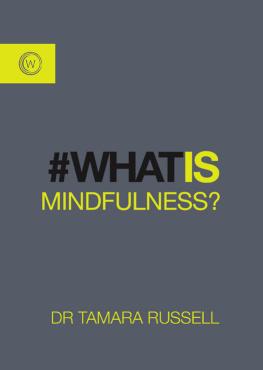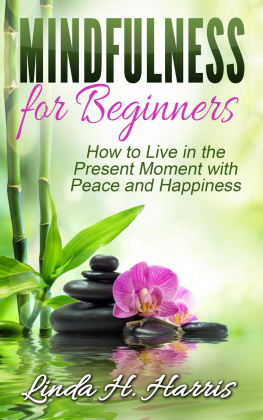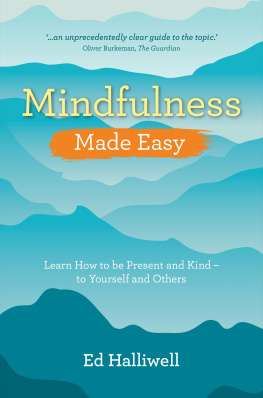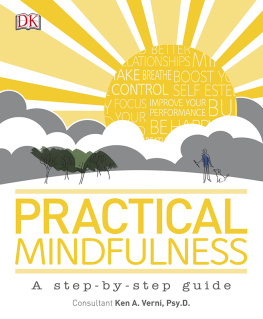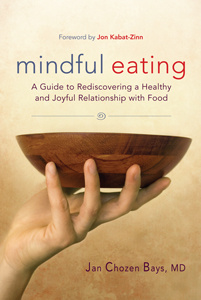The word is near you, on your lips and in your heart.
Romans 10:8
The Act of Being Present
Mindfulness is the act of showing up, of being present for the life that God has given us.
Everyday mindlessness of ordinary moments can serve as a nudge toward mindfulness. Have you ever had one of the following experiences? Maybe a critical comment has looped in your head while you were trying to sleep. Maybe youve spaced out during a conversation and missed the most important part of what was said. Perhaps youve driven all the way from work to home without any awareness of the journey along the way. Or maybe you found yourself startled to look into the eyes of someone you love and realize you havent actually seen them for a long time. If you have had any of these mindless experiences, then congratulations! You are human.
As it turns out, bringing awareness into the present moment is one of the hardest things for the adult human mind to do. Living in the moment comes more easily for very young children and also for animals, both of whom appear less consumed with the past and the future. But for the rest of us, it is natural to push through each day on autopilot as our thoughts cycle mindlessly on repeat, silently triggering emotional responses. Unaware of the bodys physical signals, we can be preoccupied with past negative experiences and potential future disasters. This disconnection from our own moment-to-moment experience can leave us feeling powerless to change unpleasant feelings and fractured relationships, and we might struggle to see or understand the workings of our own hearts and minds, much less to see Gods work in our midst.
The human experience in these modern times is often distracted, disconnected, and driven. With more technological convenience and digital communication, many of us have become more detached from the physical realities of our world as compared to past generations. We are less likely to feel the warmth of dishwater, see fireflies from the front porch, and have face-to-face interactions with one another. At the same time, we are increasingly exposed to a relentless flow of alarmist information and analysis, which pulls us into chronic, worried mental abstraction about our world. For those living in highly individualistic cultures, we have decreasing opportunities for communal connection and support. It is no wonder that mindfulness has become such a trend over the past decade. Our frenzied, anxious, detached souls are starved for calm and connection.
This is the gift of mindfulnessthe cultivation of calm and connection through intentional awareness of the present moment. Mindfulness is learning to step out of frenzied mental abstraction in order to be here. Just like showing up for class, being here for life gives us the opportunity to learn and understand the lessons provided in each moment. Being here helps us to flourish and grow in wisdom, to calm agitated emotions, and to receive the good gifts that God has built into each moment of earthly existence. Being here helps us to be available to divine guidance, care, and revelation by paying attention to Gods work. Being here is our doorway to joyful, abundant, resurrection life.
When we practice mindfulness, we cultivate an experience of the world as new, seeing things as if for the very first time. This fresh perspective helps us to be here, to be present. This is because first-time experiences have a particular richness to them, with an inherent ability to get our attention and boost our happiness levels as a result.
Recently, my friends granddaughter had this type of first-time experience when she received new hearing aids at the age of twenty-six. Having had a severe hearing loss since birth, her response to newly perceived sounds was deeply emotional. She wrote in her private blog that the loudness of car locks, keyboard sounds, keys jangling, and toilets flushing all caught her by surprise. The sound of consonants was a thrill. Classical music was incredible and three-dimensional. Her commentary about birds was especially moving: I heard birdsong this morning for the first time in my life! Most of my walk was spent alternating between standing perfectly still to listen to the world and laughing/crying about the birds. I can still hardly believe it.
As I read her blog, I asked myself, When was the last time that birdsong stopped me in my tracks while I laughed and cried in amazement? Her mindful response to the experience of sound was an appropriate response to her encounter with Gods creation. I now practice listening to birdsong with fresh ears on a regular basis, finding myself lost in amazement at such a delightful, musical, unearned gift in the midst of my everyday experience.
Mindfulness provides us with access to this type of amazement in response to the world, so that we can be transformed by an attitude of openness, wonder, and full attention. Mindfulness opens us up to the possibility of surprise and even joy as we practice being present to each moment as if we are experiencing it for the very first time. This practice of presence is invigorating, healing, and instructive, because it directs our attention to the space God inhabits: the present moment.
On its own, mindfulness is a powerful psychological tool, but it becomes especially powerful when combined with Christian faith because it readies us for divine connection. Over the past several years of practicing mindfulness within a Christian framework, I have experienced it as a conduit of Gods joy, contentment, and peace. Mindfulness has helped me to build resilience, perseverance, hope, and courage in the midst of difficult circumstances, and it has given me a level of satisfaction that Ive never known before. Along the way, mindfulness has revitalized my faith, opening me to experience Gods presence in a deep and refreshing way.


